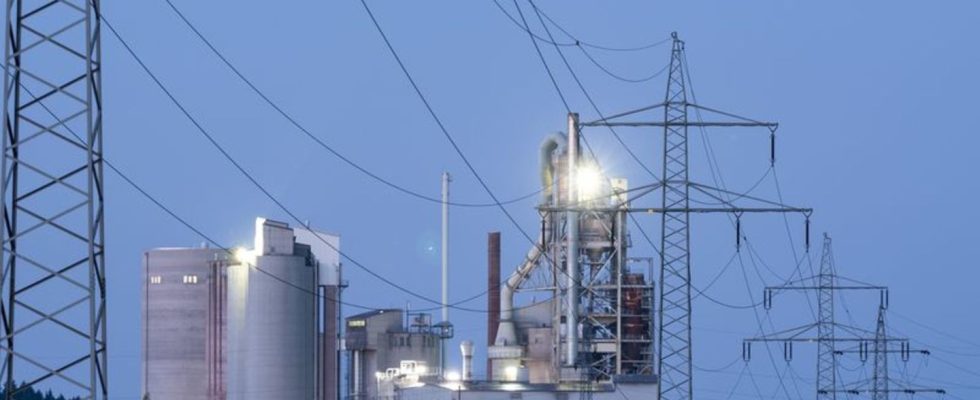Climate protection agreements
The state ensures the green transition of the economy
In so-called climate protection agreements, the state initially wants to cover the additional costs for new, more climate-friendly production methods. photo
© Silas Stein/dpa
Saving greenhouse gases is particularly difficult in energy-hungry industrial plants such as cement plants. To ensure that the expensive transition to new technologies works, the federal government is now stepping in – temporarily.
In the future, companies in Germany will be able to receive money from a new federal funding instrument worth billions to switch to more climate-friendly production methods. With the so-called Under climate protection agreements, the state initially covers the additional costs for new processes.
For the first round of bidding that has now opened, four billion euros are available for a term of up to 15 years. Federal Economics Minister Robert Habeck (Greens) presented the innovations on Tuesday in Berlin with noticeable enthusiasm: “I think it’s really something new, great and different.”
Companies that successfully took part in the preparatory process last summer can apply. The awards should go to the most cost-effective bidders. Sectors such as the paper, glass, steel and chemical industries are eligible. According to Habeck, the target group is particularly medium-sized companies. There are already other instruments for very large projects, and Habeck announced another program for smaller companies. According to the ministry, a total of around 350 million tonnes of carbon dioxide should be avoided over the duration of the funding program until 2045.
State takes risks
The companies should pay back the money when the subsidized processes have become cheaper and therefore more competitive. The federal government offers them protection against fluctuating prices, for example for hydrogen as an energy source. Electricity prices and the government-imposed CO2 price, which makes the consumption of climate-damaging fossil raw materials more expensive, also have an influence on companies’ price calculations. The whole thing was built “like an insurance instrument,” said Habeck. FDP parliamentary group deputy Lukas Köhler praised: “The expected repayments prevent companies from becoming dependent on government financial injections.”
Habeck considers the cost risk for the state to be manageable. After all, Germany has set itself climate goals; it wants to be climate-neutral by 2045, meaning that it will not be able to emit more greenhouse gases or bind them again. “If the move is clearly heading towards climate neutrality in the next 25 years, then we know approximately what amounts of green energy and what amounts of hydrogen and what prices for CO2 certificates can be expected in the next few years,” said the Minister.
CO2 certificates are certificates of authorization to emit greenhouse gases that companies can trade with. Their price is expected to continue to rise. Habeck emphasized that climate-friendly technologies are becoming increasingly cheaper, and there will be a leap in development, for example with mobile phones. “If there is anything to expect, my prediction is that everything will become cheaper faster than we expect.”
Faster decision-making processes
The new funding instrument is intended to provide companies with certainty about government support more quickly. Normally, large state funding projects from the federal government for the economy must be approved by the EU Commission. This is complex and can take years. Things are different with climate protection agreements; The EU Commission has already approved the instrument as such. The bottom line is that companies should receive funding approval much more quickly. They have four months to submit a bid that will pit them against other companies in a type of auction. To do this, they have to calculate their expected extra costs for the green transition, which is quite demanding, as the ministry admits. They should then be informed after another two months whether they will receive funding or not.
Habeck wants to keep energy-intensive industry in Germany
It is important to Habeck that companies that consume a lot of energy do not leave Germany. This often affects traditional industrial sectors such as the steel or cement industries – and the Green politician wants to keep them, even if energy costs in this country are relatively high compared to international standards. This is criticized by some economists who say that with such subsidies Germany is artificially keeping industries in the country that would find better production conditions elsewhere – and thus preventing necessary structural change. “In my view, the necessary structural change is a whitewash for the loss of workers and also the loss of energy security and loss of economic competence,” said Habeck. IG Metall also expressly welcomed the start of the tender, but wanted even more commitment to preserving endangered industrial jobs.
Tailwind from the economy, cautious support from Greenpeace
“Extensive government support is necessary if the politically desired transformation towards climate neutrality is to succeed in a short time,” said the President of the Federation of German Industries (BDI), Siegfried Russwurm. According to the budget ruling, there would be significantly less funding available for climate protection agreements in the current year than originally planned. The federal government must secure financing for the coming years. The Chemical Industry Association (VCI) called the climate protection agreements a “positive signal” and advocated establishing them in the long term and also supporting new technologies such as chemical recycling.
The environmental organization Greenpeace considers climate protection agreements to be sensible in principle, but fears that the specific conditions could be designed too laxly in the interests of climate protection. The managing director of Greenpeace Germany, Martin Kaiser, warned of “dangerous pseudo-solutions” such as the capture and underground storage of CO2 and so-called blue hydrogen, which uses natural gas to produce.

